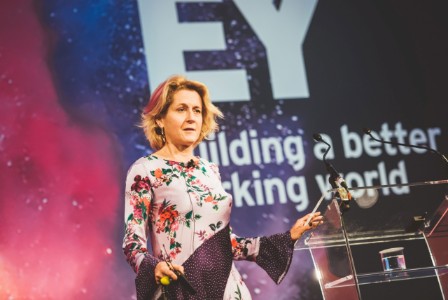“Technology is an amazing thing, but it has to remain conscious of the need to behave responsibly – that would make a huge difference in restoring trust,” she said. It is a message that is getting through to even the best-run companies: without the trust of stakeholders, even the smartest products and services will face an uncertain future.
This matters, because technology is the industry that is driving more disruption than any other, “yet it is replicating some of the worst habits of the older generation of businesses.
“Companies need to face up to some of the structural issues that are holding them back. Consider gender diversity; 95% of the world’s software engineers are men, as are 90% of venture capitalists.”
Related article
Technology is an amazing thing, but it has to remain conscious of the need to behave responsibly – that would make a huge difference in restoring trust.
Open engagement
Another speaker from the technology world picked up on this theme. Lou Hughes, a current director of Nokia, can look back on 24 years sitting on the board of directors of 13 companies across eight countries. He has more experience of audit committees than most, and in his talk he outlined what successful ones have in common.
“You need people of different backgrounds and skills,” Hughes said. “While regulators want to see financial experts on the audit committee, a broad range of experience is critical. In fact, in my experience, a lot of the best contributions come from operational management.”
The audit committee has a key role to play in creating and reinforcing trust in the organization, and Hughes believes that in this regard, the need for open engagement from all sides – boards, management, internal and external auditors – is now greater than ever. In particular, he emphasized the need for the external auditor to act as an engaged partner.
“They are the most important part of the chain,” he said. “The auditor has to understand the business virtually as well as the management does. It’s a collaborative role focused on solving problems, mitigating risk and taking the right action.”
Companies need to face up to some of the structural issues that are holding them back.
Adjusting to change
Sue Lloyd, Vice Chair of the International Accounting Standards Board (IASB), echoed Baroness Lane-Fox’s observation that, now more than ever, business must be seen to be putting its house in order.
Lloyd was present to outline the IASB’s determination to focus on working as a partner with business. “We are adjusting our work to adapt to the changing financial reporting environment, and to the feedback from companies,” she said. “They want a period of calm, and they want us to stop generating new standards and focus on providing support for the standards we already have.”
To that end, she made it clear that regulators and business must work together to make certain that standards meet the needs of both preparers and users of accounts. “A number of things that we’re working on are taking us beyond our traditional debits and credits,” she said, citing the efforts to look at non-GAAP measures and to bring some of them into the audit process. As part of that, the IASB is considering requiring all companies to provide a note to the financial statements outlining what measures of performance the company uses to communicate with investors.
While the Board would prefer to see an IFRS-related measure, she said alternatives would be accepted, as they can provide a deeper understanding of the company. Once again, it’s ultimately a question of finding ways for businesses to explain what they are doing and why, to regain the trust of stakeholders.
The views of third parties set out in this article are not necessarily the views of the global EY organization or its member firms. Moreover, they should be seen in the context of the time they were made.
Summary
Delivering the keynote at the 2018 Financial Reporting Outlook conference in London, Baroness Martha Lane-Fox spoke about the need for businesses to reconnect with their customers and prove themselves worthy of their trust. Nokia director Lou Hughes and IASB Vice Chair Sue Lloyd also touched on this theme in their presentations.


